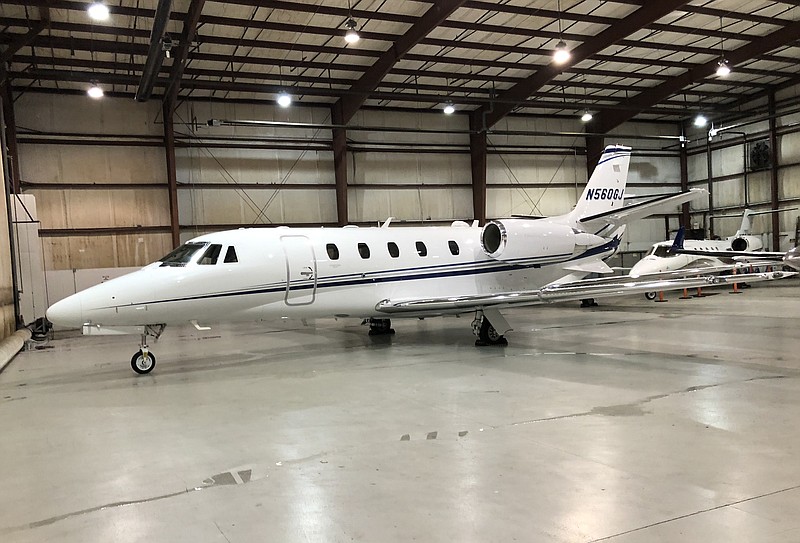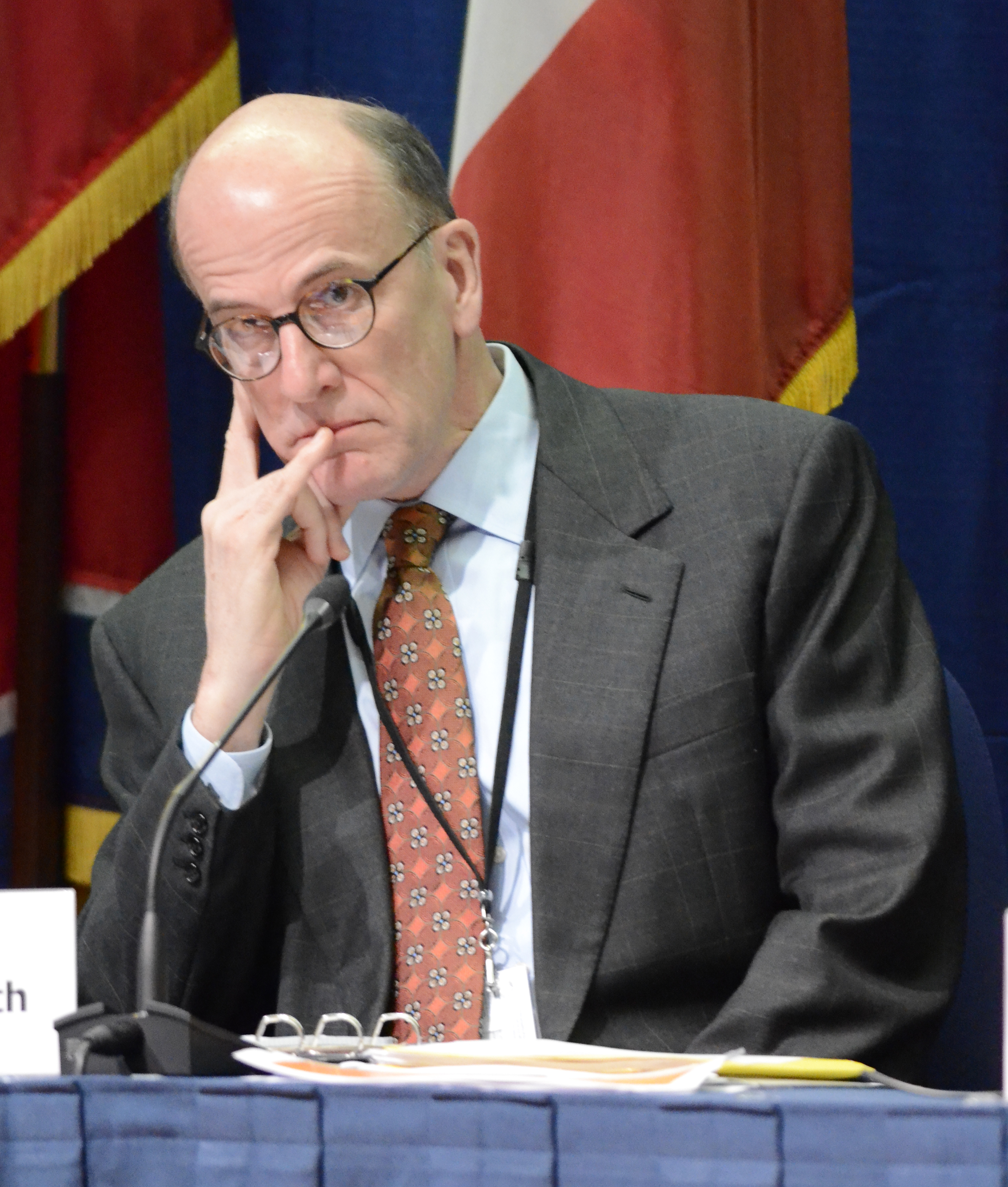The Tennessee Valley Authority sent its corporate jets or airplanes 77 times to Oxford, Mississippi, to pick up or take home TVA Chairman Richard Howorth over the past five years, including three times when Howorth was the only passenger on board the aircraft.
But a new audit of the flights released Thursday by TVA's inspector general determined all of the flights were used for official agency business and there was no fraud or abuse by the TVA chairman.
The audit was conducted to review Howorth's use of TVA's corporate aircraft after complaints were made to the Office of Inspector General that flying agency jets and airplanes to and from Oxford to carry Howorth "are an inefficient use of TVA resources."
TVA has spent nearly $29 million in the past three years to buy new and upgraded aircraft, primarily for executive travel by its top staff and board. An earlier inspector general report questioned the cost effectiveness of those purchases, concluding that the 2015 purchase of a Cessna jet instead of a cheaper turboprop plane "has not been cost-effective," since there is little difference in travel time between the aircraft.
But the newest inspector general's report noted that TVA's aircraft fleet "is generally comparable" to the number of fixed-wing aircraft maintained by eight other similar utilities reviewed in the audit.
In a six-page report, TVA Acting Inspector General Jill Matthews didn't criticize the aircraft travel by Howorth and other board members. But Matthews said the audit "did not review the cost effectiveness of using the TVA fixed-wing aircraft" for flights to Oxford.
In response to the audit, Howorth said the use of TVA aircraft for the agency's part-time board members is an appropriate and needed means of travel.
"Since board members are spread among locations across the seven Valley states and are not available to TVA on a full-time basis, the most expeditious means of travel is required so that the board can spend more time directly engaged in its work," Howorth said. "While I have used TVA aircraft for transportation for TVA business, I have always done so with efficiency and cost in mind, traveling in various ways from my home to do so."
TVA President Bill Johnson, the highest-paid federal employee in America who was recruited to TVA six years ago from Progress Energy after Johnson was paid a $44.4 million severance package from his previous employer, directed TVA to replace its aging turbo planes with higher-priced jets three years ago because he said the jets are safer and faster.
Johnson also ordered TVA in 2015 to buy a bigger passenger helicopter, ordering a $6.95 million, eight-passenger, twin-engine EC145 helicopter equipped with a $1.5 million Mercedes-Benz style interior. The craft previously was used by Dallas Cowboys owner Jerry Jones.
The inspector general has previously criticized TVA for a sole-source purchase of one of its airplanes and questioned the need for using corporate jets, rather than the less expensive turboprop planes that TVA has used for most of its 85-year history. TVA has purchased two new Cessna jets in the past three years at a cost of nearly $22 million. Those aircraft have been used primarily by TVA's executive staff and its nine part-time board members.
Critics of the TVA aircraft, including the NAACP and the tea party, question why the agency is buying more aircraft when its staff and corporate size is shrinking and the utility is no longer building major new baseload power generation facilities.
Stephen Smith, executive director of the Southern Alliance for Clean Energy and an airplane pilot himself who brought the flight information to the TVA inspector general, continued Thursday to question why the agency is spending so much on its executive aircraft.
"These part-time board members seem beholden to the TVA staff and don't seem to be providing much oversight or accountability, and I don't see why the ratepayers in the Tennessee Valley should be paying to fly a bunch of rubber-stamping board members around in jets," he said. "We believe that the use of these planes and helicopters needs to be constantly reviewed and audited, and we have asked for a complete investigation, not just an audit."
Other federal agencies covered by the General Services Administration don't even allow federal employees, in most instances, to fly first class on commercial airlines or to charter private jets without a waiver from GSA rules. Former Health and Human Services Secretary Tom Price resigned last year over amid sharp criticism of his use of taxpayer-funded charter flights, and EPA Administrator Scott Pruitt resigned on Thursday after a variety of allegations against him, including flying first class without a waiver.
As an independent, self-funded federal agency, TVA is not covered by the GSA rules. Johnson said TVA actually has fewer and smaller aircraft than other comparable investor-owned utilities in the Southeast.
But Smith said other utilities such as Southern Co. and Duke Energy operate different businesses and plants across the country and don't have as limited a service region as does TVA.
"TVA also was supposed to be the yardstick and, as a government corporation, it should be more focused on public service than investor-owned utilities," he said.
TVA spokesman Jimmie Hopson said the newest audit "confirms that all fixed-wing aircraft flights to Oxford, Mississippi, were for official TVA business purposes." Hopson said TVA is still reviewing and analyzing the earlier March inspector general's report, which questioned some of TVA's aircraft policies and purchase procedures.
"The March report identified areas where we agree that improved documentation is needed," Hopson said Thursday. "We are currently upgrading our processes and policies to reflect those recommendations."
Smith said TVA has not responded to Freedom of Information Act requests about its aircraft use, but his group's review of FAA records shows "clear examples where Bill Johnson, and potentially other executives, are using these planes and jets in inappropriate ways" by flying to Johnson's second home outside of the Tennessee Valley in Raleigh, North Carolina where his wife, Sally, resides. FAA flight records indicate TVA's aircraft were dispatched at least 31 times to Raleigh, where Johnson has a home, Smith said.
In its earlier audit, the Office of Inspector General said "some aircraft usage appeared to be for the personal preference and convenience of TVA's chief executive officer" and was used to transport Johnson's wife at least three times.
"If any of the travel was for personal reasons [for either the CEO or his spouse], TVA should have imputed the fringe benefit income to the CEO for the value of the transportation," the earlier audit concluded.
Hopson said TVA has evaluated all such flights against federal travel guidelines "and, where needed, the appropriate paperwork was submitted to the Internal Review Service" to reflect the increased taxable income for Johnson or other executives.
But TVA has not made any filings yet with the U.S. Securities and Exchange Commission reflecting any change in the compensation for Johnson, who was paid a total of $6.7 million in salary, bonuses, pension and deferred compensation last year.
Contact staff writer Dave Flessner at dflessner@timesfreepress.com or 423-757-6340.

